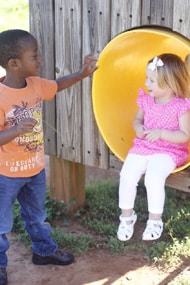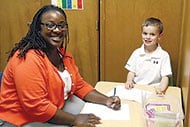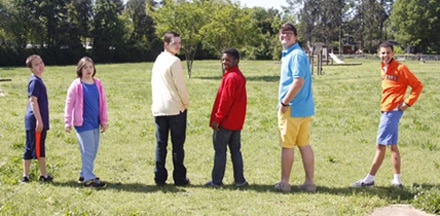
Students at The Bridge of Georgia love photo sessions! Outside is even better. Each year, the students pose at local Monroe, Georgia businesses for a calendar that raises funds for their school. Even the camera-shy have decided to join in the fun and show the world their beautiful faces.
It is a puzzle that changes form and function in response to diverse stimuli keeping families and caregivers on their toes. At The Bridge of Georgia, a special needs school located in Monroe, students who are “wired” differently learn, grow, and thrive with a plan that best incorporates their personal puzzle pieces for success on levels suited specifically for each child.
School founder, Tami Burt, began with an idea and developed a business plan that was intended to bring together the vast number of resources needed for serving children with special needs. For many parents, Tami exceeded the goal by bringing the time-consuming resources vital to their children’s growth under one roof. Her mission was in response to many years of watching parents split their resources between a child with autism and their neurotypical siblings. “I didn’t breathe a word of the plans until we knew we had a school,” says Tami. I couldn’t bear to have those parents hold out hope and not be able to provide what they needed.”
The services and plans at The Bridge of Georgia range from classroom to medical space with a variety of therapies under one roof. Ideas for those services flowed with lightning speed from Tami’s pen to her notepaper when she attended a stakeholders meeting for the State Autism Plan two years ago and realized that there was a need for a school that provided space for growth in medical, vocational, speech, occupational, physical, and transition services for students on the Autism Spectrum of all ages outside of the public school setting. “I knew I had to figure out how to meet the needs of the community in their neighborhood,” says Tami. “When I found out that this building (former Monroe Primary School) had become available, I had peace that this was where we would locate.”

“Peyton is very social, but his cognitive skills are below the expectation for his chronological age,” says Kathy. “At The Bridge, he has become more aware of what is going on at school and in the world; he is exposed to age appropriate topics and gets the things he is exposed to.” Both Kathy and Stephen agree that since Peyton began at The Bridge, he has made huge improvements on his social and educational goals in a nurturing environment that provides the services he qualifies for. “We don’t have to get 20 people to agree before something can be implemented” says Kathy. “He gets 1:1 attention, which is how he learns best.”
Figuring out how students learn best and helping the teachers find ways of teaching the unique learners at The Bridge is Head of School, Tammy Wineinger’s job. “I teach the teachers,” says Tammy. “When we interview teachers, we look for someone who has the right spirit and believes in the success of each child.” Under Tammy’s guidance, the school teaches to mastery of concepts instead of depending solely upon presenting grade-level concepts and teaching to tests. “These teachers are here because they want to make a difference and do something meaningful,” says Tammy. “Teaching to mastery is more peaceful and creates an atmosphere of success.”
Touring the school, Tami Burt provides a running commentary on how the school provides a positive learning atmosphere with supportive teachers in an environment free of the frustrations many parents felt when their children attended public school. “We hear over and over the number of things parents were told their children ‘can’t’ or ‘will never’ do,” says Tami with a smile. “We know better, these kids are capable of so much.” A case in point involves a 7th grade girl who is capable of reading a novel independently, but needs 1:1 direct instruction on how to work a zipper. “We never give up on what they are able to do, but we also pay attention to what they need help with in order to succeed,” says Tami.
Peyton’s dad agrees with the assessment that all special needs children have different learning styles that can be addressed without using the words, “can’t” or “won’t ever”. The efforts by the school transfer to home and other social settings which benefit the child, family, and community. “We had a home issue with Peyton-he HATED to get his hair cut and it was a battle every time,” says Stephen. “The Bridge has a salon where Peyton could get his hair cut without the extra sensory input; now, he tells US when it is getting too long!”
It is the simple things like getting your hair cut that can make or break an entire day for a child with Autism and their families. A parent trying to accomplish simple errands might forget the order in which things need to be done to accommodate the inner workings of the sensory-sensitive brain. One small change could result in an attention-getting tantrum that siblings and parents would rather not endure in front of strangers.

Explaining Autism to anyone without the experience of loving an autistic child can be puzzling at best. The pieces of the neuroatypical child are often scattered into a seemingly impossible riddle, but Peyton’s dad has an analogy that speaks to many for whom technology is a daily way of life. “It is like all of the information is written to the hard drive, but the program can’t always read the disk.” While assembling a puzzle that is constantly changing seems like a futile endeavor, the teachers, parents, staff, and surrounding community see it more as a work of art that is fluid and capable of change and improvement without losing integrity.
For more information visit: www.TheBridgeofGeorgia.org or call 770-406-6111.


